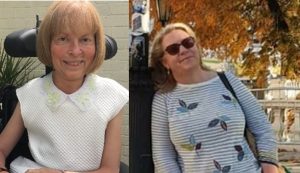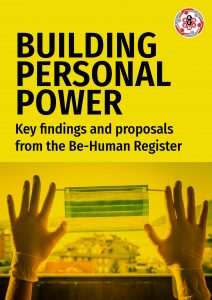Building Personal Power
Baroness Jane Campbell and Julie Stansfield
As the Covid-19 pandemic emerged the partners in the Be-Human movement knew that it would cause big problems for both people and the professionals supporting them. Over many years disabled and older people and those who have long term health conditions have set out to build our personal and collective power. This is an essential part of our political struggle for rights and resources. Supporting this can be a challenging process for professionals in the care and support field at the best of times. They often work within inflexible systems which struggle to see the individual person, their life and circumstances and respond appropriately.
As Covid emerged, following a roundtable with NHSE personalised Care Group and with support from Esmee Fairburn Foundation the partners decided to take action. They needed both to make sure that people’s experiences were recorded but also to offer help. This was because though it was vital to register experience to ensure post pandemic action, this would not be enough – they had do something to help, there and then.
The report published week describes what they did. It tells the story of the people who registered their experience and the kinds of assistance that made a difference. It also identifies practical help that could be further developed to the benefit of both the people using public services and the people offering support.
Its core theme is power. Many of the people who registered their experience faced challenges that were sometimes caused, sometimes made tougher by limitations on their personal power. In offering help a range of ways of supporting people to grow their power were critical, on a continuum from “supported to do it yourself” to formal mediation or legal intervention.
The challenges related were in some cases very specific to the COVID-19 context, but in many they might be seen as exacerbations of issues and barriers faced pre-COVID-19 that will be relevant post COVID-19. For the report some people told us of their challenges and how support was useful. Often just a little advice or signposting allowed people to get things sorted. Sometimes things were tougher or more complex. Support therefore ranged on a continuum from brief advice allowing people to resolve an issue themselves all the way through to supporting complaints or legal intervention. Between these extremes were: “supported do it yourself”; “tactical advice”; “informal or formal mediation”.
The tougher situations were stressful and costly for everyone involved:
A complex situation had arisen that required legal advice during the first lockdown in May. I had made three calls to local solicitors but each firm stated they were not taking on any more clients. In Control responded within one hour. I was asked to specify the circumstances regarding the problem that had arisen with the local social services and the residential care home. My question was submitted to the appropriate solicitor who responded with detailed advice within 24 hrs. I was able to use this very clear advice and get a speedy resolution with the statutory services in question
I was struggling to work out how to connect families with the patients who needed to isolate, a discussion with Be Human helped me balance my core duty to keep people safe with a core humanity for both the persons wellbeing and their families
Without the help and support I would never (have) been able to challenge the local authority and have their decision overturned….Our local authority can be very challenging more often than not. They would not listen or interact with me. After contacting In Control for help and advice I was guided through the red tape and I was supported every step of the way. In-Control contacted the council and fought our corner. Without the knowledge, help and support… we would never have achieved a positive outcome for our son.
My son continues to live independently with support in his own home. Their involvement has changed his life from repeated admissions to hospital and has provided independent support to the family being able to monitor practice by Authority.
A key reflection of those offering support was that “just enough of the right kind of support at the right time”, could make a very significant difference, in the interests of local people. practitioners and system leaders. Focussing support in this way was far better than at a later stage when relationship damage had taken place and more expensive formal mediation or legal processes became necessary.
As we emerge to living with Covid effects in the coming months, we need to consider how the lessons from these people’s experiences can inform mutually beneficial local change. Power is not a zero sum game. A win-win-win can be achieved where local systems, professionals and the people they are there to support could all benefit. Have a read of the report if you want to know how
With big thanks to the many Partners for their collaboration in Be Human
Esmée Fairbairn Foundation, NHSE, Disability Rights UK, Learning Disability England, MIXIT, Knowsley Disability Concern, Exhuberance, West Lancashire Peer Support & the Reimagining Self Directed Support Group & all those who are attending, speaking and sharing on the webinars.
Particular thanks to Sue Bott, Tricia Nicoll and Miro Griffiths


